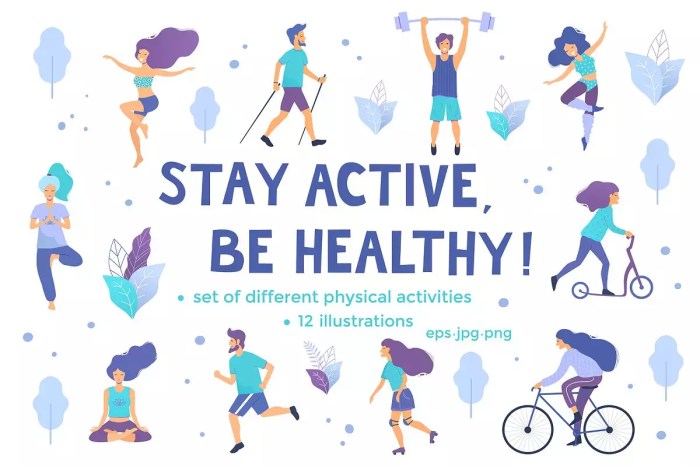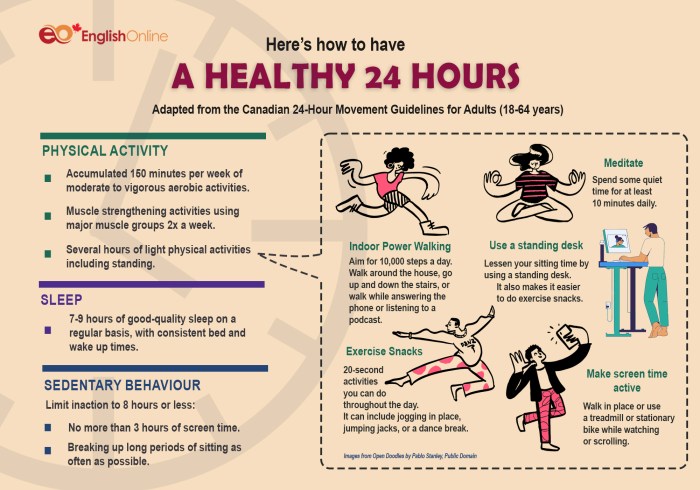Embark on a journey to better health with our simple steps for staying fit and healthy. From exercise tips to nutrition advice, this guide has you covered.
Learn how to make positive changes in your lifestyle that will have a lasting impact on your well-being.
Importance of Physical Activity

Regular physical activity is crucial for maintaining good overall health. Not only does it help in improving cardiovascular health, reducing the risk of chronic diseases, and boosting mental well-being, but it also plays a key role in maintaining a healthy weight.
Benefits of Regular Exercise
- Improves cardiovascular health and reduces the risk of heart disease.
- Helps in managing blood sugar levels and reducing the risk of type 2 diabetes.
- Strengthens muscles and bones, reducing the risk of osteoporosis.
- Boosts mood and mental health by releasing endorphins.
Types of Physical Activities
- Aerobic exercises like walking, running, or cycling for cardiovascular health.
- Strength training with weights or bodyweight exercises for muscle strength.
- Flexibility exercises like yoga or stretching for joint mobility.
- Balancing exercises to improve stability and prevent falls.
Maintaining a Healthy Weight
Regular physical activity helps in burning calories and maintaining a healthy weight. Combining exercise with a balanced diet is essential for achieving weight management goals.
Simple Exercises at Home
- Bodyweight squats for lower body strength.
- Push-ups for upper body strength.
- Planks for core stability.
- Jumping jacks for cardiovascular fitness.
Balanced Diet and Nutrition

Eating a balanced diet is crucial for staying fit and healthy as it provides the body with essential nutrients needed for optimal functioning. A balanced diet includes a variety of foods that offer a range of vitamins, minerals, protein, carbohydrates, and fats to support overall well-being.
Essential Nutrients for Optimal Health
- Protein: Important for muscle repair and growth, found in sources like lean meats, fish, eggs, and legumes.
- Carbohydrates: Provide energy for daily activities, found in foods like whole grains, fruits, and vegetables.
- Fats: Necessary for hormone production and absorption of fat-soluble vitamins, found in sources like nuts, seeds, avocados, and olive oil.
- Vitamins and Minerals: Essential for various bodily functions, found in fruits, vegetables, dairy products, and whole grains.
Importance of Hydration
Adequate hydration is vital for overall well-being as water is essential for regulating body temperature, transporting nutrients, and removing waste products. It is recommended to drink at least 8 glasses of water per day and more if engaging in physical activity to prevent dehydration and support optimal bodily functions.
Tips for Planning Healthy Meals and Snacks
- Include a variety of foods from different food groups in each meal to ensure a balanced intake of nutrients.
- Opt for whole, unprocessed foods whenever possible to maximize nutrient content and minimize added sugars and unhealthy fats.
- Plan ahead and prepare meals and snacks in advance to avoid impulsive food choices and ensure nutritious options are readily available.
- Listen to your body’s hunger and fullness cues to maintain a healthy relationship with food and prevent overeating or undereating.
Adequate Rest and Recovery

Rest and recovery play a crucial role in any fitness routine as they allow the body to repair and rebuild itself after intense physical activity. Without proper rest, the risk of injury, fatigue, and burnout increases, hindering progress and overall well-being.
Impact of Sleep on Physical and Mental Health
Getting an adequate amount of quality sleep is essential for both physical and mental health. During sleep, the body repairs muscles, consolidates memories, and regulates hormones. Lack of sleep can lead to decreased performance, impaired cognitive function, weakened immune system, and increased risk of chronic conditions such as obesity and heart disease.
Tips for Improving the Quality of Sleep
- Avoid caffeine, nicotine, and heavy meals close to bedtime.
- Establish a bedtime routine to signal to your body that it’s time to sleep.
- Create a comfortable sleep environment by keeping your bedroom dark, quiet, and cool.
- Avoid screens (phones, tablets, computers) at least an hour before bed as blue light can disrupt sleep.
- Stay consistent with your sleep schedule, aiming for 7-9 hours of sleep per night.
Relaxation Techniques to Reduce Stress Levels and Enhance Recovery
- Practice deep breathing exercises to calm your mind and body.
- Engage in activities like yoga or meditation to promote relaxation and reduce stress.
- Take short breaks throughout the day to rest and rejuvenate your mind.
- Consider incorporating massages or warm baths to relax muscles and improve recovery.
- Listen to soothing music or nature sounds to help you unwind and prepare for sleep.
Ultimate Conclusion

Take charge of your health today by following these simple steps. Stay motivated, stay active, and enjoy the benefits of a fit and healthy life.